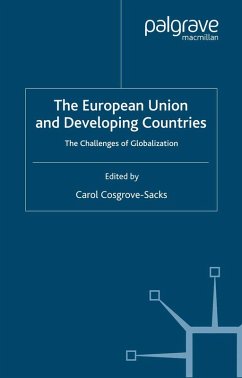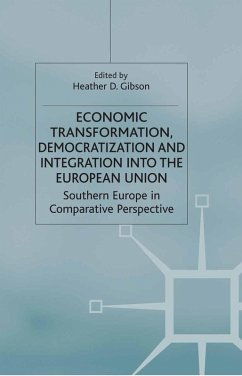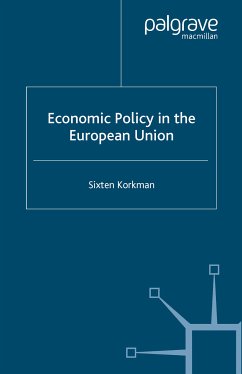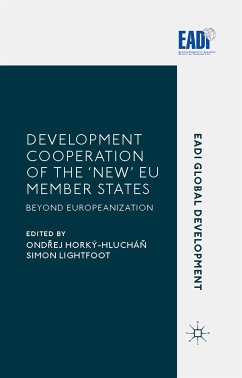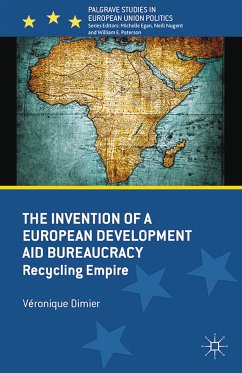The European Union and Developing Countries (eBook, PDF)
The Challenges of Globalization
Redaktion: Cosgrove-Sacks, C.
73,95 €
73,95 €
inkl. MwSt.
Sofort per Download lieferbar

37 °P sammeln
73,95 €
Als Download kaufen

73,95 €
inkl. MwSt.
Sofort per Download lieferbar

37 °P sammeln
Jetzt verschenken
Alle Infos zum eBook verschenken
73,95 €
inkl. MwSt.
Sofort per Download lieferbar
Alle Infos zum eBook verschenken

37 °P sammeln
The European Union and Developing Countries (eBook, PDF)
The Challenges of Globalization
Redaktion: Cosgrove-Sacks, C.
- Format: PDF
- Merkliste
- Auf die Merkliste
- Bewerten Bewerten
- Teilen
- Produkt teilen
- Produkterinnerung
- Produkterinnerung

Bitte loggen Sie sich zunächst in Ihr Kundenkonto ein oder registrieren Sie sich bei
bücher.de, um das eBook-Abo tolino select nutzen zu können.
Hier können Sie sich einloggen
Hier können Sie sich einloggen
Sie sind bereits eingeloggt. Klicken Sie auf 2. tolino select Abo, um fortzufahren.

Bitte loggen Sie sich zunächst in Ihr Kundenkonto ein oder registrieren Sie sich bei bücher.de, um das eBook-Abo tolino select nutzen zu können.
This book examines the ways in which EU policies towards developing countries are changing in response to the new challenges of globalization and the end of the Cold War. It analyses the patchwork of relationships between the fifteen Member States and more than 140 countries throughout Africa, Asia, Latin America and the Mediterranean.
- Geräte: PC
- ohne Kopierschutz
- eBook Hilfe
- Größe: 1.24MB
Andere Kunden interessierten sich auch für
![Economic Transformation, Democratization and Integration into the European Union (eBook, PDF) Economic Transformation, Democratization and Integration into the European Union (eBook, PDF)]() Economic Transformation, Democratization and Integration into the European Union (eBook, PDF)40,95 €
Economic Transformation, Democratization and Integration into the European Union (eBook, PDF)40,95 €![Constructing European Union Trade Policy (eBook, PDF) Constructing European Union Trade Policy (eBook, PDF)]() Constructing European Union Trade Policy (eBook, PDF)73,95 €
Constructing European Union Trade Policy (eBook, PDF)73,95 €![Economic Policy in the European Union (eBook, PDF) Economic Policy in the European Union (eBook, PDF)]() Sixten KorkmanEconomic Policy in the European Union (eBook, PDF)40,95 €
Sixten KorkmanEconomic Policy in the European Union (eBook, PDF)40,95 €![The Multinational Enterprise, EU Enlargement and Central Europe (eBook, PDF) The Multinational Enterprise, EU Enlargement and Central Europe (eBook, PDF)]() Y. AkbarThe Multinational Enterprise, EU Enlargement and Central Europe (eBook, PDF)40,95 €
Y. AkbarThe Multinational Enterprise, EU Enlargement and Central Europe (eBook, PDF)40,95 €![Development Cooperation of the 'New' EU Member States (eBook, PDF) Development Cooperation of the 'New' EU Member States (eBook, PDF)]() Ondrej Horký-HluchánDevelopment Cooperation of the 'New' EU Member States (eBook, PDF)40,95 €
Ondrej Horký-HluchánDevelopment Cooperation of the 'New' EU Member States (eBook, PDF)40,95 €![At the Heart of the Union (eBook, PDF) At the Heart of the Union (eBook, PDF)]() At the Heart of the Union (eBook, PDF)73,95 €
At the Heart of the Union (eBook, PDF)73,95 €![The Invention of a European Development Aid Bureaucracy (eBook, PDF) The Invention of a European Development Aid Bureaucracy (eBook, PDF)]() V. DimierThe Invention of a European Development Aid Bureaucracy (eBook, PDF)44,95 €
V. DimierThe Invention of a European Development Aid Bureaucracy (eBook, PDF)44,95 €-
-
-
This book examines the ways in which EU policies towards developing countries are changing in response to the new challenges of globalization and the end of the Cold War. It analyses the patchwork of relationships between the fifteen Member States and more than 140 countries throughout Africa, Asia, Latin America and the Mediterranean.
Dieser Download kann aus rechtlichen Gründen nur mit Rechnungsadresse in A, B, BG, CY, CZ, D, DK, EW, E, FIN, F, GR, HR, H, IRL, I, LT, L, LR, M, NL, PL, P, R, S, SLO, SK ausgeliefert werden.
Produktdetails
- Produktdetails
- Verlag: Palgrave Macmillan UK
- Seitenzahl: 365
- Erscheinungstermin: 17. Mai 1999
- Englisch
- ISBN-13: 9780230509184
- Artikelnr.: 38166908
- Verlag: Palgrave Macmillan UK
- Seitenzahl: 365
- Erscheinungstermin: 17. Mai 1999
- Englisch
- ISBN-13: 9780230509184
- Artikelnr.: 38166908
- Herstellerkennzeichnung Die Herstellerinformationen sind derzeit nicht verfügbar.
CAROL COSGROVE-SACKS is Director of the Trade Division in the United Nations Economic Commission for Europe in Geneva and a Professor at the College of Europe, Bruges. She is an experienced and respected trade development economist, a professor, entrepreneur and manager. Previously she has taught at the universities of Basel, Reading, Aberdeen, Surrey, and Tufts (London and Boston, USA). She is also the author/editor of 11 books and over 70 articles, mainly on international relations and trade development issues. She has served on the executive boards of the Central Statistical Office (UK), the Management Centre Europe (Brussels), and the Institute of Development Studies (UK). As Director of the Trade Division of the UNE/ECE her principal professional priority is to support the integration of the transition economies into European and global markets.
Foreword; J.Delors Preface Acknowledgements List of Abbreviations Notes on the Contributors PART ONE: FORCES SHAPING EU DEVELOPMENT POLICY An Introduction to EU Development Cooperation; C.Cosgrove-Sacks The Role of the European Commission; B.Claes The Role of the European Court of Justice; J.Larsson France and EU Development Cooperation; J.Rajoharison The United Kingdom and EU Aid; P.Tod Mediterranean Influence on EU Policy; A.Oddone Nordic Approaches to EU Development Policy; A.Amorsson PART TWO: THE LOME CONVENTION: THE EU AND THE AFRICAN CARIBBEAN AND PACIFIC STATES (ACP) EU-ACP Relations in the Mid 1990s; G.Scappucci The Record of the Trade Provisions; K.Radtke The European Development Fund; E.Giaufret The European Investment Bank; A.De Castro South Africa and Lome; C.Haupert ECHO: Humanitarian Aid; E.Ascroft PART THREE: THE MEDITERRANEAN CHALLENGE A Review of the Barcelona Conference and a Summary of EU Policy Objectives; F.J.Raya Turkey, Cyprus, Malta: Potential EU Members?; M.P.Pace Israel and the EU; A.Kosnikowski PART FOUR: THE PERIPHERY: EU COOPERATION WITH ASIA AND LATIN AMERICA EC Investment Partners Programme; S.Lamigeon EU-ASEAN Relations; M.Bonet India and the EU; J.Vandenborre EU-ANDEAN Relations; K.Kowald PART FIVE: COMMERCIAL INSTRUMENTS OF EU POLICY EU Trade Policy and Preferences; B.Atkinson EU Textiles Policy and Developing Countries; M.Lemaitre The EU and the World Trade Organisation; C.Costello Globalization and EU Relations with Developing Countries; C.Cosgrove-Sacks Index
Foreword; J.Delors Preface Acknowledgements List of Abbreviations Notes on the Contributors PART ONE: FORCES SHAPING EU DEVELOPMENT POLICY An Introduction to EU Development Cooperation; C.Cosgrove-Sacks The Role of the European Commission; B.Claes The Role of the European Court of Justice; J.Larsson France and EU Development Cooperation; J.Rajoharison The United Kingdom and EU Aid; P.Tod Mediterranean Influence on EU Policy; A.Oddone Nordic Approaches to EU Development Policy; A.Amorsson PART TWO: THE LOME CONVENTION: THE EU AND THE AFRICAN CARIBBEAN AND PACIFIC STATES (ACP) EU-ACP Relations in the Mid 1990s; G.Scappucci The Record of the Trade Provisions; K.Radtke The European Development Fund; E.Giaufret The European Investment Bank; A.De Castro South Africa and Lome; C.Haupert ECHO: Humanitarian Aid; E.Ascroft PART THREE: THE MEDITERRANEAN CHALLENGE A Review of the Barcelona Conference and a Summary of EU Policy Objectives; F.J.Raya Turkey, Cyprus, Malta: Potential EU Members?; M.P.Pace Israel and the EU; A.Kosnikowski PART FOUR: THE PERIPHERY: EU COOPERATION WITH ASIA AND LATIN AMERICA EC Investment Partners Programme; S.Lamigeon EU-ASEAN Relations; M.Bonet India and the EU; J.Vandenborre EU-ANDEAN Relations; K.Kowald PART FIVE: COMMERCIAL INSTRUMENTS OF EU POLICY EU Trade Policy and Preferences; B.Atkinson EU Textiles Policy and Developing Countries; M.Lemaitre The EU and the World Trade Organisation; C.Costello Globalization and EU Relations with Developing Countries; C.Cosgrove-Sacks Index
